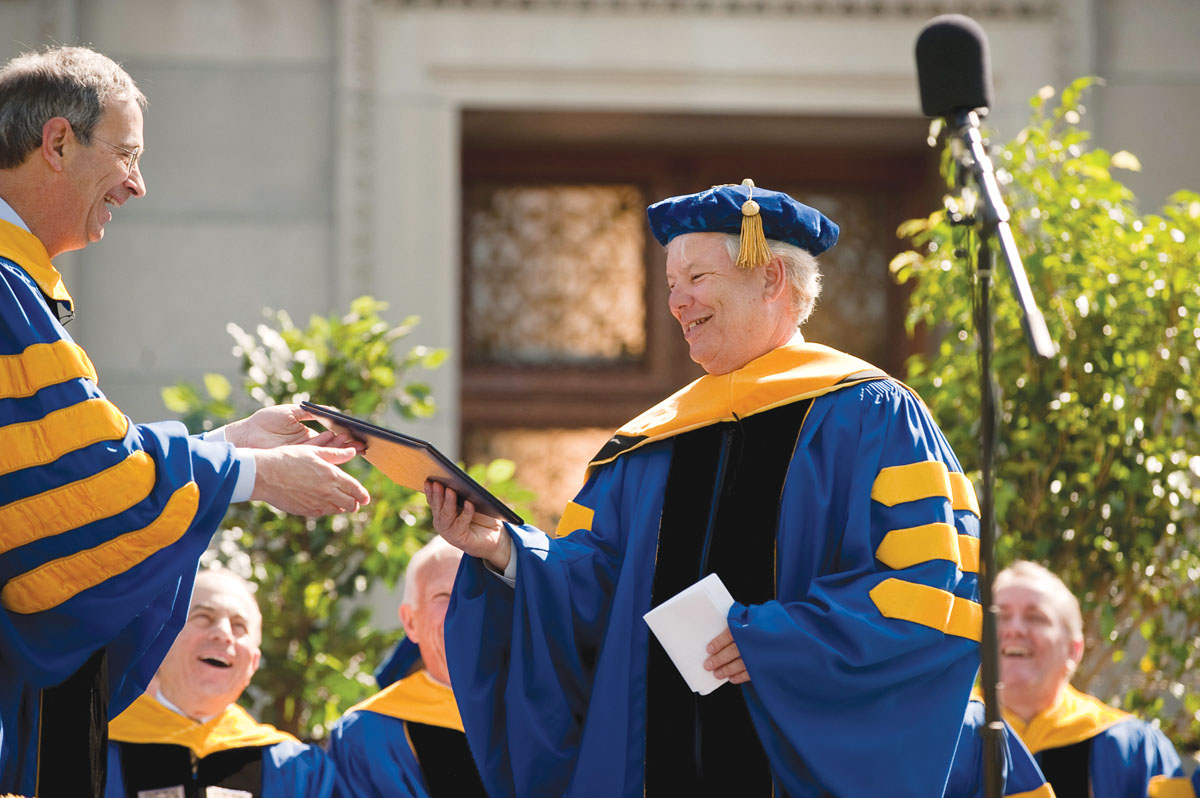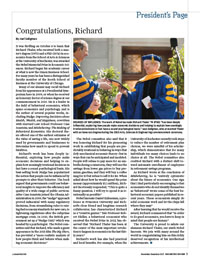President’s Page
 DEGREES OF INFLUENCE: The work of Nobel laureate Richard Thaler ’74 (PhD) “has been deeply influential, exploring how people make economic decisions and helping to explain how seemingly irrational decisions in fact have a sound psychological basis,” says Seligman, who presented Thaler with an honorary degree during the 2010 Arts, Sciences & Engineering commencement ceremony. (Photo: J. Adam Fenster)
DEGREES OF INFLUENCE: The work of Nobel laureate Richard Thaler ’74 (PhD) “has been deeply influential, exploring how people make economic decisions and helping to explain how seemingly irrational decisions in fact have a sound psychological basis,” says Seligman, who presented Thaler with an honorary degree during the 2010 Arts, Sciences & Engineering commencement ceremony. (Photo: J. Adam Fenster)It was thrilling on October 8 to learn that Richard Thaler, who received both a master’s degree (1970) and a PhD (1974) in economics from the School of Arts & Sciences at the University of Rochester, was awarded the Nobel Memorial Prize in Economic Sciences. Richard began his academic career at what is now the Simon Business School. For many years he has been a distinguished faculty member of the Booth School of Business at the University of Chicago.
Many of our alumni may recall Richard from his appearance at a Presidential Symposium here in 2009, or when he received an honorary doctor of science degree at our commencement in 2010. He is a leader in the field of behavioral economics, which spans economics and psychology, and is the author of several popular works, including Nudge: Improving Decisions about Health, Wealth, and Happiness, cowritten with Harvard Law School Professor Cass Sunstein; and Misbehaving: The Making of Behavioral Economics. His doctoral thesis offered one of the earliest estimates of the value of saving a life, one now widely used by governments and businesses to determine how much to spend to prevent fatalities.
Richard’s work has been deeply influential, exploring how people make economic decisions and helping to explain how seemingly irrational decisions in fact have a sound psychological basis. His best-selling book Nudge has popularized the notion that people can be influenced by prompts to alter their behavior. The book argued that governments could use behavioral insights to improve the efficiency and quality of a wide range of public services. After Cass Sunstein joined the Obama Administration in 2009, the “nudge” approach proved influential with many regulatory decisions, from streamlining rules to raising fuel economy standards for new cars, to tightening regulations after the subprime mortgage crisis. In 2010, the British government set up a “Nudge Unit,” which was headed by a psychologist. The Nobel committee said that Richard, who made a guest appearance in the 2015 film The Big Short, has provided a “more realistic analysis of how people think and behave when making economic decisions.”
The Nobel committee also said that it was honoring Richard for his pioneering work in establishing that people are predictably irrational in behaving in ways that defy neoclassical economic theory—but in ways that can be anticipated and modeled. People will refuse to pay more for an umbrella during a rainstorm; they will use the savings from lower gas prices to buy premium gasoline; and they will buy a coffee mug for $3 but refuse to sell it for $6. When asked about how he would spend the prize money (approximately $1.1 million), Richard facetiously responded, “This is quite a funny question. I will try to spend it as irrationally as possible.”
Nobel laureate Daniel Kahneman, a professor at Princeton University and Richard’s close friend and longtime research collaborator, has characterized Richard as a “creative genius.” Yale Professor Robert Shiller, a behavioral economist who received the Nobel Prize in 2013, has observed that “Richard Thaler has been at the center of the most important revolution to happen in economics in the last thirty years.”
Richard’s work has also had practical and local benefits. For example, when the University of Rochester recently took steps to reduce the number of retirement plan choices, we were mindful of his scholarship, which demonstrates that for many individuals too many choices leads to no choice at all. The Nobel committee also credited Richard with a distinct shift toward automatic enrollment of employees in retirement savings programs.
As Richard wrote at the conclusion of Misbehaving, he is “entirely optimistic about the future of economics. One sign that I find particularly encouraging is that economists who do not identify themselves as ‘behavioral’ wrote some of the best behavioral economic papers published in recent years. These economists simply do solid economic work and let the chips fall where they may.”
After learning that he would receive the award, Richard commented that “in order to do good economics, you have to keep in mind that people are human.”
The University is proud to salute our alumnus Richard Thaler, our ninth Nobel laureate. We join with many around the world in congratulating him on this richly deserved recognition of his intellectual achievements.

